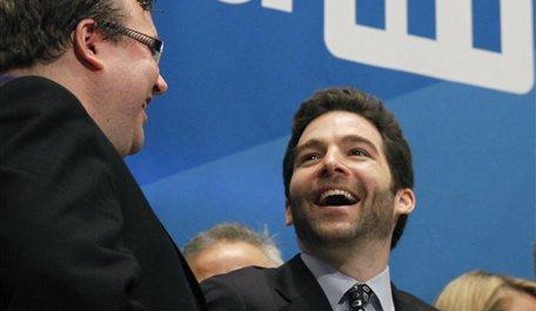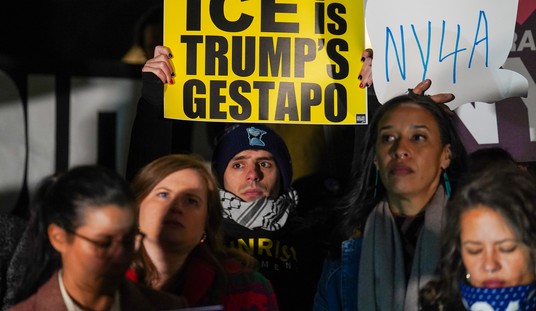Sketch this out for me. He’s apparently running and, if you believe the latest, er, Zogby poll, he’s now suddenly in second place behind, er, Mitt Romney. Fair enough. Tell me, then, which early states does he win?
Not Iowa, right? That state’s going to be carved up five ways, among Huckabee/Santorum (social conservatives), Rand Paul (libertarians), Bush/Romney (establishmentarians), Ted Cruz (full-spectrum tea partiers), and Scott Walker (the midwesterner who checks all the boxes). How does Rubio elbow his way past all of that and find a winning margin? If he can’t, that’s okay — there’s always New Hampshire. But … how does he win there? The big-money establishmentarians, Mitt and Jeb, will go all out knowing that NH is traditionally the catapult for centrists to the nomination. Paul will go all out, expecting that NH’s maverick-y electorate will prove that the rEVOLution can win big primaries in purple states. Christie will go all out, fearing that it’s his last chance to prove he’s a more formidable RINO than Bush or Romney and hoping that Hampshirites prefer a blunt, confrontational, centrist maverick to Rand Paul’s libertarian kind. (They did when they voted twice for McCain.) Walker will go all out, trusting that New Hampshire is more likely than Iowa or South Carolina to prefer a checks-all-the-boxes stood-up-to-the-special-interests candidate. How does Rubio elbow his way past that? Doesn’t he have to finish, at the barest minimum, in the top three in one or both of these very tough states to keep going?
Maybe he doesn’t. Maybe he’s focused on South Carolina instead.
https://twitter.com/mckaycoppins/status/558693769663750145
Okay. But winning South Carolina after losing Iowa and New Hampshire means somehow beating the winner(s) of those races, who’ll have momentum behind them and a bounce in the polls. It can be done, of course. In 2012, Santorum won Iowa, Romney won New Hampshire, and then Newt Gingrich pulled the upset in South Carolina. That feels like apples and oranges with 2016, though — Gingrich won South Carolina partly because he was the closest thing to a “southern” candidate among the big three at the time and partly because the field was exceptionally weak and Romney held in low regard. That won’t be true next year. Whoever wins New Hampshire will be a credible, serious threat for the nomination. Unless it’s Huckabee or Santorum, whoever wins Iowa will be too. If Rubio’s going to win South Carolina after losing the earlier states, there would have to be some dynamic where Republicans nationally were deeply split and needed to settle on a compromise candidate. I can sort of see that if Huckabee wins Iowa and Paul wins New Hampshire, but it’s hard to see in any other circumstance. And even if it happens, why would Rubio suddenly become the compromise candidate instead of a governor like Walker or Jindal?
So he probably loses South Carolina too. But then comes Florida, his home state! And … what then? If Jeb Bush is still in the race at that point, having won one of the previous three states, he’d be a heavy favorite to win there. If he isn’t still in the race, then a Rubio victory will be dismissed on grounds of home-field advantage. And honestly, my hunch is that if Rubio’s in position to win Florida, he’s probably done so surprisingly well in Iowa, New Hampshire, and/or South Carolina that he almost doesn’t need Florida anymore. It’ll be icing on the cake towards the nomination, not the state that launches him.
All of which is to say, if he’s going to contend, he needs to somehow supplant the person or persons who currently occupy one of the niches in the field long before it comes time to vote. He can’t be the guy people turn to in the end, after the party somehow deadlocks over the rest of the candidates. He needs to run strong in all of the early states, and that means pushing some people out of his way. The most obvious target is, of course, Jeb Bush:
https://twitter.com/justkarl/status/558690798917537792
Excellent question and one Rubio will spend the next year figuring out how to ask tactfully. What is the reason for preferring Bush to him? Rubio’s younger, more charismatic, hails from Florida, has stronger Latino cred than Bush does, has run for office this decade, and oh, by the way, won’t spend the entire general election being compared by the media to George W. Bush. If you like Jeb because you’re an amnesty fan, well, Rubio’s the guy who tried to sell the Gang of Eight bill to the right. What has Jeb done for you lately? And Rubio will be more palatable to most of the right as nominee than Bush will, his Gang of Eight heresy notwithstanding. Jeb’s only meaningful credential over Rubio is that he has executive experience — and, of course, that he has many more fundraising resources at his disposal thanks to his Bushworld connections. Rubio’s got a case that he, not Jeb (and certainly not the also-ran Mitt Romney), should be the establishment favorite, but how does he go about convincing the donor class of that when so many of them are backing Jeb out of personal loyalty? Even if Rubio gets a foothold in the polls, it’s hard to imagine Bush — and Romney — faltering to the point where both of them are nonfactors by the time that voting begins. There’s simply too much money behind them. In which case all of the above analysis still obtains.
James Pethokoukis says Rubio should carve his own niche:
So the Rubio role is quite obvious. He’s the guy offering fresh, relevant, conservative reforms. In his new book, American Dreams: Restoring Economic Opportunity for Everyone, Rubio outlines an economic plan that takes timeless conservative principles — faith, family, free enterprise – but adapts their policy manifestations to the current challenges confronting middle- and working-class America. For instance: As part of broader tax reform that would reduce anti-investment business taxes, Rubio would also provide immediate tax relief to families by expanding the federal Child Tax Credit. This reflects the economic reality that cranking up GDP growth, while a necessity, may no longer be sufficient to lift all boats — at least not right away. Macroeconomic trends such as globalization and automation are restructuring the American economy so that income gains are flowing heavily to those at the top. The Rubio plan, jointly developed with Sen. Mike Lee, also addresses the fundamental financial unfairness that parents — unlike childless adults – pay the taxes that support Medicare and Social Security while also investing in future taxpayers, their kids. There’s a lot more in the book, everything from innovative higher education reform to pro-work support for low-income families to anti-cronyist deregulation.
So, yeah, there is a logical slot for Rubio. He would be the Man With the (21st century, middle-class, conservative) Plan.
Rubio’s the kitchen-table candidate, at least in theory. If he runs on that message, it’ll be an interesting test of how much of a constituency there is for that among a primary electorate that typically splits along cultural lines. I’m not optimistic, but it’ll be fun to watch.








Join the conversation as a VIP Member